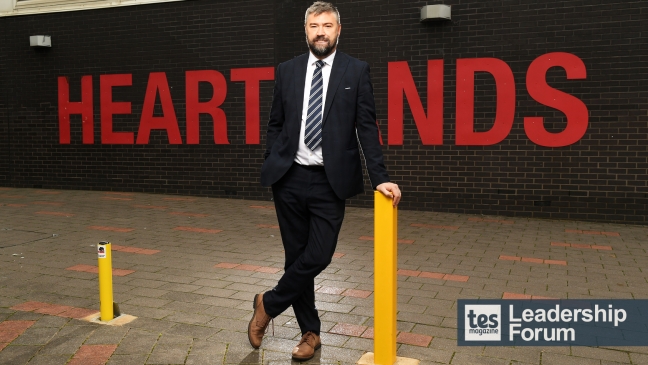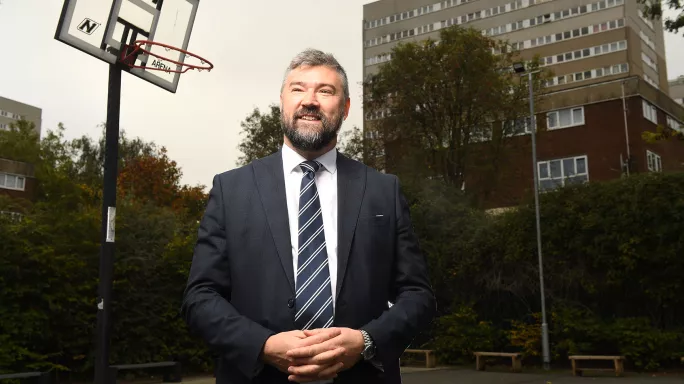
- Home
- Leadership
- Tips & Techniques
- Tom Campbell: âSurvivorâs guilt drove my leadership obsessionâ
Tom Campbell: âSurvivorâs guilt drove my leadership obsessionâ

Tom Campbell is CEO of E-ACT, a multi-academy trust of 39 schools. He has previously held roles as chief education officer at Greenwood Academies Trust and principal at Fullhurst school in Leicestershire. He started his career as a psychology teacher. He writes:
I didnât choose teaching, it chose me. But I definitely chose headship. As a young teacher, I had this frustration that some of those in leadership positions were not doing enough with the power they had - to improve the schools, to support disadvantaged kids and make life better for them. I felt, arrogantly, that I could do better. And that arrogance eventually turned into a conviction that this was a job I needed to do.
I applied for my first headship when I was 30 years old in a school that advertised itself as being the worst in the country. It had been through nine headteachers in a short space of time. It looked like the sort of school I went to as a child. The community it served was the sort of community I grew up in. It was special measures, low pupil numbers, huge deficit budget - people didnât understand why I would risk it. My view was that I couldnât make it any worse but I could bring a perspective and authenticity with that community that could add something.
I grew up in Denny, just outside Glasgow. It was challenging: six of us in a council house, no central heating, no double glazing, the area was struggling, the school was poor and even got bulldozed just after I left. It was very sectarian in Denny. There was a lot of crime. And it was all around you: there was a boy in the year below me who was murdered in his bed. I was frequently scared. But there wasnât any support back then, nobody spoke of trauma - you just had to find a way to survive.

Ìę
People make assumptions about kids from working-class communities: that they are not loved or looked after at home. When those people are doing their breakfast clubs or their pupil premium strategies, that assumption is often there. Actually, in almost all cases, those kids are loved and they are looked after, but how that is expressed often depends on the resources available to families.
In that first headship, we had the same people working in the school when it was âinadequateâ as when it was in the top 100 schools for Progress 8 in the country. You need to love the people you are with. It is a shared journey. And if you do that, there is an improvement mentality embedded in every person in that school and success is shared success. That is incredibly powerful. The stability in the adults helped the kids build trust. That was the foundation for our rapid improvement.
You canât turn around a school in one or two years. You have to live that school. It has to become your life. If you leave after a year or two, we all know it turns back around and falls again. The turnaround I led took around seven years, and it is now on its fourth consecutive âgoodâ inspection - it has been âgoodâ for a very long time. Itâs because that school - both staff and children - was an extension of my family, and that provided the climate for real, sustainable change.
I was 18 when my brother died by suicide. It was the most shocking experience you can have at any time of life, but when you are 18 and two weeks into university, for that to happen it just turned me inside out. And maybe the leadership thing became an obsession as a result. I knew life could stop at any moment. I didnât want to hang around. And nearly 30 years on, looking back, it was probably a distraction, working so hard to do those roles I wasnât ready for - a leadership responsibility as a newly qualified teacher (NQT; now early career teacher or ECT), an assistant head at 26, a deputy head at 28, a head at 30. It compensated for the survivorâs guilt.
There was a lot of fake confidence in me in my teens and early 20s, but I was riddled with anxiety. I was not physically well. But, on the outside, I appeared cocky and ambitious. People can be very different from how they seem.
I donât need everyone I work with to be on a mission to help disadvantaged kids. I have that mission; what I need in order to lead is people with talent. Without talent, you become a passenger. You can have someone who is hugely mission orientated, but if they canât teach, or if they canât talk to children, they canât help you. I can have a diversity of missions in my team: what I need is people who can do their jobs.
When I took the E-ACT role I felt I needed to fill some gaps in my knowledge of running a big organisation. I wasnât going to make a success of it just because I gave it the time and passion. So I went to Cambridge and did a Master of Business Administration (MBA) alongside the job. I was more productive and I was thinking clearer as a result. I have since completed the high-performance leadership programme at Oxford. I am always looking for opportunities to develop - not to collect badges. There is also something about a kid from Braes View doing Oxbridge, seeking validation perhaps.

Ìę
If youâre working with disadvantaged kids, you can start with sympathy (âOh those poor kidsâ) and move to empathy (âI want to be there for those kids the way someone was for meâ) but you then need to kick on further into compassion. Compassion allows you to make decisions and to lead in a way that finds the right balance of both challenge and support. Tough love comes with compassion. You canât do that if you are only being sympathetic or empathetic.
It was my own experience in school that placed the chip on my shoulder. I was getting good grades and I was invited into school for an awards evening. Me and my mum went, and the headteacher went down the line shaking hands and chatting to each person. He stopped at me, looked me up and down, and he said: where do you live? And I said the Braes View estate. And he just went on to the next person. What they communicated to me at that moment was that I wasnât worth the same as somebody else, that there was a pre-determination that I should not have been there - that I should not be getting awards for academic achievement given where I lived. It crushed me. It crushed my mum.
As I become more confident in my own skin, I am becoming more confident in having a say about the wider system - more confident feeling that my opinion is allowed to be shared. I want to be a fierce advocate for schools. I want to be a fierce advocate for disadvantaged families. And I want to make sure the system works for those families. We have a long, long way to go. Some people are doing good work in this space, but some are just taking up space, time and resources. The latter need to actually get into schools and make a difference. And if they canât or donât, they need to back off and let those who can give it a go.
You need a Tes subscription to read this article
Subscribe now to read this article and get other subscriber-only content:
- Unlimited access to all Tes magazine content
- Exclusive subscriber-only stories
- Award-winning email newsletters
- Unlimited access to all Tes magazine content
- Exclusive subscriber-only stories
- Award-winning email newsletters
You need a subscription to read this article
Subscribe now to read this article and get other subscriber-only content, including:
- Unlimited access to all Tes magazine content
- Exclusive subscriber-only stories
- Award-winning email newsletters
- Unlimited access to all Tes magazine content
- Exclusive subscriber-only stories
- Award-winning email newsletters
topics in this article




